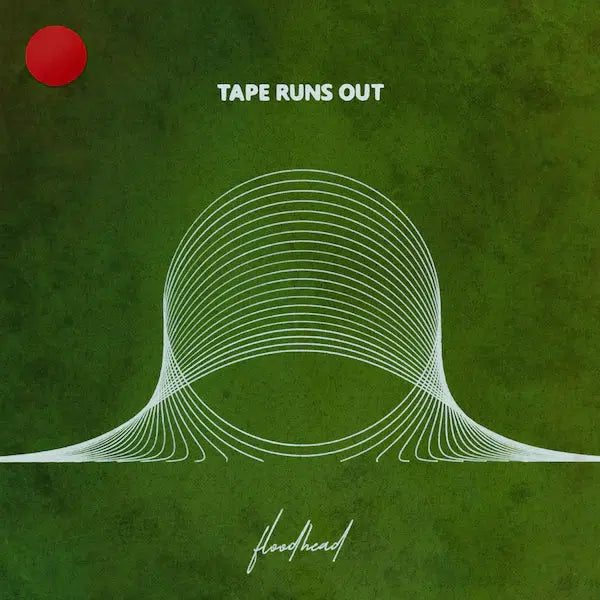
The thing about waiting for 10 years to release your debut LP is that you really get the chance to make sure you’ve made the best record you can. There is of course the risk you aren’t putting the best songs you’ve ever written on it. Most bands will have written stuff together, bashed them out in the practice room, demoed them, played them live a lot, and finally got to record them properly. And I would put good money on the vast majority of the first albums being the best an artist ever releases (notable exceptions obviously).
Liam Goodrum-Bell has written a lot of songs. From the bedroom electronic tracks to the excellent recent EPs, and now here we are, Floodhead, made in guitarist Dan Dawson’s Norwich studio. Some bands can lose the ability to harness that early spark. Liam is the exception. He has finessed the art of crafting the song. He says himself that he is a perfectionist when it comes to writing and recording. If it isn’t right then it doesn’t go on the finished product.
Floodhead took a year to record, and you can hear that labour of love in the meticulous detail and concise nature of the album. They chose not to do an LP until they had the right record label, the right backing, and the right formats to make it an official release. In Trapped Animal Records they found the home for it.
Liam has said that he had certain influences in his head when recording and there is an overall atmosphere that lodges itself somewhere in between OK Computer and Kids A, in the epic swells of synth and string, in the distorted vocal effects, in the change of pace that drives through orchestral majesty, keyboard quirk, dulcimer flourishes and guitar roar. There are several suites in individual songs with complex arrangements intertwined that gives the record texture and scope.
Floodhead is when the front of the wall of water hits, but also the overwhelming feeling when there is too much going on in your brain and it becomes all-encompassing. ‘Jab’ starts with walking through dry grass, but are they coming or going? It is a melancholic start to the record. Gently strummed chords, faint brass panning across, like a morning call, a slow sunrise, dulcimer-like wind in the trees and charms. Then drums slowly build like approaching horses or rumbling wheels, before it explodes into life. The calming end with a gaggle of voices like people meeting in a cafe or coffee shop.
‘Arc’ is a stunningly beautiful follow-up. Again, Dulcimer gives everything a gentle, breezy feel, a piano hook becomes cyclical and hypnotic. You wouldn’t expect dulcimer and electric guitar to work quite so well. Like a medieval musician trying to duel with a time travelling axe wielder.
‘Souvenir’ is quite a traditional rock song in comparison with what has come before (and still to come) but it has a travelling pace which still suits the momentum of the album. It was the obvious choice for lead single, and whilst not indicative of the whole LP, it’s not incongruous. There’s a Tape Runs Out sound that this doesn’t betray.
‘The Garden’ is the centrepiece of the record, coming in two parts, part one is dreamy and evokes an English country garden on a warm spring day. There’s a babbling stream (dulcimer), violin are the birds diving and swooping. ‘The Garden Part II’ is the dulcimer solo, violin aides and abets, harmonic vocals appear, and it’s now A Midsummer Night’s Dream. Nymphs and pixies are dancing around in the twilight. If this is sounding a bit twee, it really isn’t. This whole LP is a bit dream-like and ethereal, otherworldly and parallel dimensional, as if this is being played out in Liam’s head.
‘In The Muddles’ is almost an interlude or a bridge. Scattergun drums and percussion are rain on a tin roof. ‘Overseas Assignment’ is an early crescendo, the second chorus is an elongated coda, beautiful strings, and the subtle guitar that underpins the whole record.
The second single ‘Paperback’ is the album distilled into a radio-friendly unit shifter, all the elements are present, whereas ‘Souvenir’ was missing the strings of both varieties, it’s an infectious song that has the tempo to lift the latter stages of the LP. ‘90C’ is a hymnal, like a Fleet Foxes song that flips into a Kid A finale that keeps going and going but never gets old; in fact, it could keep going for a few minutes more.
‘Pillowtalk’ is the nine-minute payoff. There’s a suit of tracks in this song alone. You get the feeling there were more that had to be cut out, that it went on for 20 minutes in jam sessions. Liam said that there were originally twelve tracks but this must always have been the end. “I’m tired,” he opines like a mantra to himself as he struggles to stay awake. As it launches into the final crescendo it is as if he has been awake all night and this is the morning arriving, maybe too soon, but it sounds full of hope, like a new beginning.
Floodhead is genuinely a monumental achievement. Distilling everything that lead up to this in over a decade of smaller but not insignificant releases, however it feels like it was building up to this. This is a stunning record, one that needs to be heard, preferably, on your own, on repeat, as night turns to day, turns to night, and to day again. Have a good wallow. Find your clarity.
[embedded content]
Reader Rating0 Votes
0
